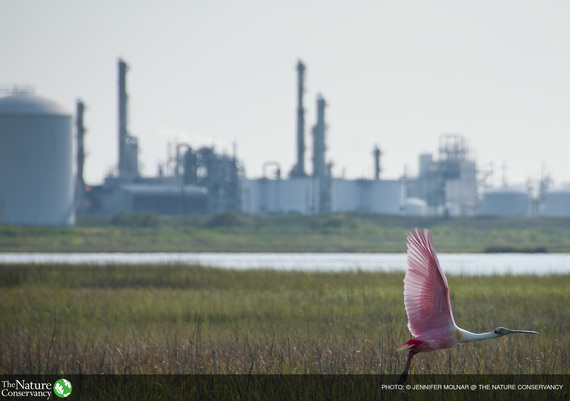Blog co-authored by:
Glenn Prickett, Chief External Affairs officer for The Nature Conservancy (TNC)
Neil Hawkins, Chief Sustainability Officer and Corporate Vice President, The Dow Chemical Company
Marshes, mangroves, coral and oyster reefs can help protect people and businesses from destruction caused by hurricanes and flooding.
We know it may sound odd that nature can safeguard us from natural disasters. But we know it works, because we've studied it. Our research found that adding green infrastructure to more conventional infrastructure, such as dykes and levees, can help mitigate damage and loss.
Our study's findings align with the recently adopted United Nations Sustainable Development Goals, specifically Goal 15: Protect, restore and promote sustainable use of terrestrial ecosystems, sustainably manage forests, combat desertification and halt and restore land degradation and halt biodiversity loss.
There is a business value to valuing nature. By attempting to quantify nature's economic value, we can help companies understand how much nature is worth - thus encouraging them to preserve more of it.
Some may question why or whether people should even try to attach a dollar value to nature. After all, nature is truly priceless. No amount of money can bring a species back from extinction, for example. However, as threats to nature grow faster and more widespread than the traditional methods can work to solve them, the conservation movement must seek innovative ways to increase its impact, which has been one of the primary concerns of The Nature Conservancy.
If we do only the things that preserve small areas of land, we will never do enough to sustain the natural world that we want our children and grandchildren to know and cherish, and that the economy and business will need in the future. If we don't estimate nature's economic value, we essentially mark it "zero" by default when businesses and governments decide how to invest their capital and develop natural resources.
By assigning economic values - even imperfect ones - to the business benefits of nature, we enable companies to consider investing in important conservation projects that they might not otherwise even consider - and consider nature across all business decisions. By doing this, we not only create a culture of respect for the benefits of nature that can't be measured, we also create a platform that allows corporations to strategically value nature in business decision making - which is good for businesses, and good for nature.
Dow's 2025 Sustainability Goals make it the first company ever to commit valuing nature at an enterprise level by setting a financial target, committing to deliver $1 billion in net present value through projects that are good both for business and for ecosystems by 2025. To accomplish this, the company has teamed up with The Nature Conservancy to take this largely theoretical concept - that the value of nature to a company can be measured - and created a practical way to put it into practice.
Through pilot site testing, we have created analytical tools for managers to assess the financial benefit of conservation, to companies and to local communities, as well as values that can't be measured in dollars, like species survival and human well-being. While Dow's Nature goal won't solve all the problems of conservation, it can make a significant contribution ... especially if other companies follow suit.
Restoring healthy ecosystems is at the heart of every major sustainability challenge and this approach provides a new, strong method to help continue to make progress toward our cause.
The collaboration between Dow and The Nature Conservancy demonstrates that valuing nature can be profitable for business. This insight can unleash investment capital and influence political decisions for conservation in ways that we've only imagined until now. Business will come to the table as the economic value becomes more and more evident over time. We invite you to join us in our pursuit.

